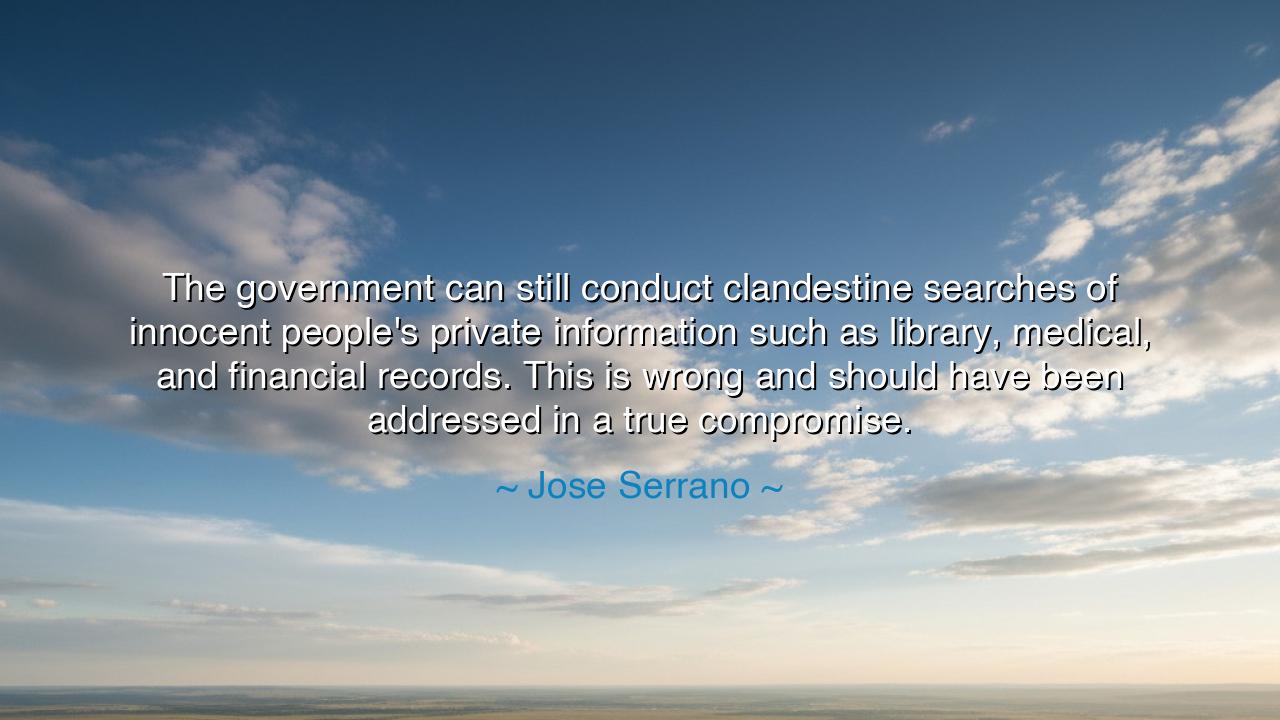
The government can still conduct clandestine searches of innocent
The government can still conduct clandestine searches of innocent people's private information such as library, medical, and financial records. This is wrong and should have been addressed in a true compromise.






In the voice of Jose Serrano we hear a cry against silent injustice: “The government can still conduct clandestine searches of innocent people’s private information such as library, medical, and financial records. This is wrong and should have been addressed in a true compromise.” These words, spoken in a time when fear and power threatened liberty, remind us that the measure of freedom is not in grand speeches but in the unseen sanctity of personal life. For when private spaces are pierced by secret eyes, the soul itself begins to tremble.
The heart of his warning lies in the phrase clandestine searches. A government may justify them in the name of safety, but when such searches fall upon the innocent, they transform from protection into violation. To take a man’s library records is to intrude upon the sanctum of his mind, to see what he reads, what he learns, what he dreams of becoming. To seize his medical records is to expose his wounds and vulnerabilities, which should be guarded with the tenderness of a healer, not wielded by the machinery of the state. To pry into his financial records is to strip him of dignity, reducing his life to numbers, debts, and possessions.
History gives us shadows of this truth. In the days of the Inquisition, men and women lived in fear that their private thoughts, their books, or even the whispered ailments of their bodies might be revealed to powers that sought not understanding but control. And in more recent times, under totalitarian regimes, secret police combed through private letters and accounts, sowing terror in every household. In all such examples, it was not merely the guilty who suffered, but the innocent whose peace was stolen. Serrano, in naming this danger, joins the chorus of those who have seen liberty crumble under the weight of unchecked surveillance.
He also speaks of compromise, that sacred word of democracy. A true compromise is one that balances safety with freedom, justice with mercy. But when compromise fails—when fear tips the scales too far—then rights are eroded quietly, piece by piece, until the people awaken to find themselves bound in chains they did not see being forged. Serrano’s lament is that the balance was not struck, that the innocent remain exposed while the state retains too much unseen power.
The deeper meaning is that freedom is not lost in one blow, but in a thousand small cuts. Each clandestine search, each tolerated violation, is a step away from dignity and a step toward submission. The ancients warned of this: that a people who do not guard their liberties will lose them not to conquerors but to their own rulers, who claim to act in their name. Thus, Serrano’s words are a call to vigilance, to remember that privacy is not a luxury but a pillar of human dignity.
The lesson is clear: if we desire freedom, we must protect it not only in public squares but also in private spaces. Let us speak against secret intrusions, demand transparency, and build laws that honor both safety and liberty. On a personal level, let each of us remain mindful of what information we share, and to whom we entrust it. On a communal level, let us support leaders and policies that uphold the sacred balance between protection and privacy.
Therefore, take Serrano’s words into your heart: guard your liberties, for they are fragile. Question the powers that act in secret. Demand a true compromise where justice and freedom stand hand in hand. For if we remain silent, the watchful eyes of the state will creep ever further into our homes, our books, our bodies, and our souls. But if we stand vigilant, we ensure that the dignity of the innocent remains untouchable, and that the light of freedom does not fade.






AAdministratorAdministrator
Welcome, honored guests. Please leave a comment, we will respond soon